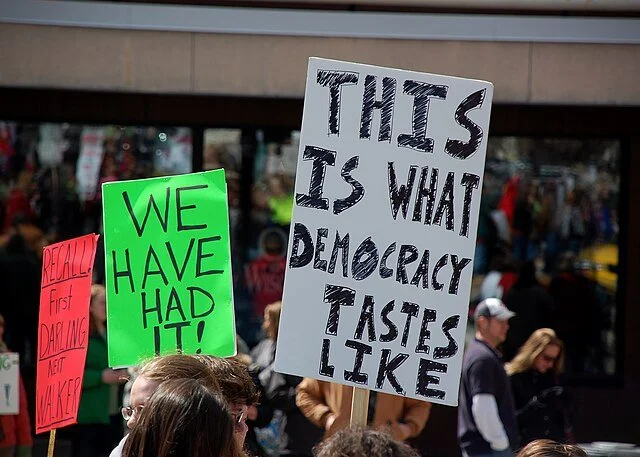How Gerrymandering Shapes the Power of the American Vote
Image Credit: Lena via Wikimedia
The concept of gerrymandering may seem alien to those unfamiliar with U.S. politics, but across the pond, it continues to change the way people vote in unprecedented ways.
Gerrymandering is essentially when politicians choose their voters, rather than voters choosing their politicians. It is a practice where electoral boundaries are manipulated to favour a particular party and maximise their vote. In the current fraught political climate, many Republican state legislatures are attempting to maximise their current hold on power by passing new congressional boundaries to increase the number of Republican seats in future elections, despite their growing unpopularity.
If this seems absurd to you, it should. In the UK, constituency boundaries are set by four independent boundary commissions that only take into account the number of registered voters - not who they vote for - so that each constituency falls within a population quota. There are many rules and regulations (too boring to get into here) that the boundary commissions must abide by in order to keep the process fair and strictly non-partisan.
While some states in the USA have similar nonpartisan commissions, other maps are drawn up by whichever party is in control of the state legislature at the time. This is why Democrats in Texas fled the state back in August, in order to try and prevent a vote on a new map that would create five new Republican-leaning seats in next year’s House of Representatives election.
Whilst gerrymandering is historically associated with the Republicans, President Trump’s unprecedented push for red states to redraw their maps, in order to give his party extra seats, has left Democrats no choice but to fight back. In California, voters had their say this week in a referendum to scrap their independent commission and allow the state legislature to redraw their map. This map would give the Democrats five extra seats in California - effectively cancelling out the Republican gains in Texas.
This measure passed comfortably as California Governor Gavin Newsom framed it as a fight back against Trump and his administration’s actions, which are deeply unpopular in the solid blue state. Even former president Barack Obama weighed in through an advert, saying that “democracy is on the ballot” and that “the whole nation is counting on [California]”.
Yet, what hope is there when the only way to fight undemocratic actions is by… committing the same undemocratic actions? Those on the left of the political spectrum are having to take these measures in order to “save democracy”, but voters themselves are now so far removed from the process regardless of which party they support. California voters essentially voted for the dilution of their voting power just for the ‘greater good’ of the country.
Creating five new Democratic-leaning seats in California or five new Republican-leaning seats in Texas doesn’t help any of the ordinary people who are going to be placed in incoherent, pinwheel-like congressional districts. Voters will be displaced, communities split apart and the only winners will be the opportunist politicians who do not have voters’ interests at heart. And it has the potential to get even worse.
The Supreme Court is considering striking down Section 2 of the Voting Rights Act, which bans voting practices that discriminate based on race, resulting in districts that are made up of a majority of ethnic minority voters who largely vote Democrat. Analysis shows that if this decision is taken, Republicans could gain up to a dozen more seats in the House at the expense of not just all Democrats, but especially these minority voters who already struggle with historical disenfranchisement.
This has the potential to get rid of all Democratic representation in Tennessee, South Carolina, Alabama, Mississippi and Louisiana. All ex-Confederacy states, this decision would have catastrophic consequences for the voting power of African Americans living in the Deep South.
It is noteworthy that the UK has 215 more MPs than the number of representatives in the U.S. House, despite having 20% of its population. But with such gerrymandering now being committed by both parties, democracy will only continue to erode - the very thing that Democrats are claiming to defend.

